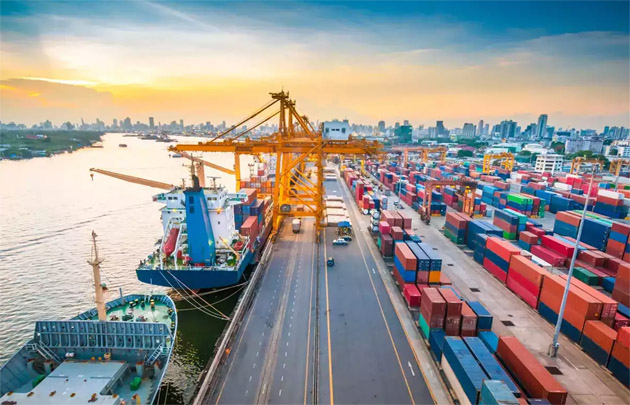By K R Sudhaman
At a time India is in advanced stage of negotiations with United Kingdom and European Union on free trade negotiations, there are warning bells to suggest trade diversions from China to India using FTAs with some of the countries.
There are no doubts about immense benefits to India in having useful free trade agreements with the strategic developed countries and blocks and this has been corroborated by studies by former senior economist in finance ministry and trade expert H A C Prasad in collaboration with Exim Bank of India. The study also advocated taking forward to some form of economic and trade grouping the current strategic regional forum of India with QUAD
It may also be difficult for India to be a partner of any FTA in the near future where China is the major player as decisions on FTAs cannot be separated from geopolitical considerations. But FTAs/CECAs with some advanced countries like US,UK,EU could be beneficial for India and its FTA partners.
Prasad however is of the view that there are indications of Trade diversion from China to India by these countries. India needs to quickly utilize the opportunity to see that Trade diversion to India coupled with Investment diversion becomes a reality as many foreign investors are planning to move lock, stock and barrel from China.
Already India has concluded CECA with Australia and CEPA with UAE. Services sector has also been included in both. Negotiations on India-UK FTA is progressing well and India-EU FTA has been restarted. But India-US FTA negotiations appear to be stalled due to the US policy, though trade negotiations on many fronts are progressing with the US.
Reviews are taking place in the case of India – Sri Lanka FTA and a few others. There is now a realisation that past FTAs were flawed. So, a careful but quick review of existing FTAs on the lines of zero-budgeting along with concluding new useful FTAs with major trading partners of India is important, Prasad said adding negotiations in Indo-UK and Indo-EU FTAs should be brought to a logical conclusion at the earliest.
If necessary India should not hesitate to terminate some less useful FTAs or make them more useful for India at least at the time of renewal, he said.
Elaborating on the pitfalls of certain FTAs, Prasad pointed out that some countries are in multiple FTAs and the same commodities are included in tariff concessions in different FTAs. He therefore advocated some uniformity in tariff concessions.
The tariff concession for a tariff line by India should be the same for all FTAs. This will help in avoiding an FTA partner trying to misuse the best concessions in the FTA which has relatively lower preferential tariffs. This will also help in removing the confusion to domestic producers and make actions of a multiple FTA partner predictable, he emphasized.
Many FTAs of India to developing countries have resulted in mainly giving tariff concessions. So,a proper evaluation of the less developed and developing countries needs to be done to see whether they have graduated to a level where tariff concessions may not be needed for some items or whether the same countries are competing against India, using the tariff concessions.
With US withdrawing GSP benefits to India but not to some developing FTA partners of New Delhi, India will be more open to competition in the US market from its FTA/RTA partners. These countries get tariff concessions in India’s FTAs, some as LDC partners. These very countries which continue to enjoy US GSP benefits, compete against India in the very same commodities for which GSP has been withdrawn for India, particularly Bangladesh. Vietnam which is a part of India – ASEAN FTA is also very competitive in some products like textiles. This needs to be addressed by introducing graduation and sun-set clauses in India’s FTAs, particularly earlier FTAs at the time of review, Prasad said.
FTAs should be based primarily on economic gains resulting in tariff liberalization on both sides without affecting sensitive sectors particularly agricultural sector. Political, Strategic or other gains should be only secondary. During negotiations for new FTAs in the future, if the MFN tariffs of the partner countries are already zero, near-zero or low, India should try to get maximum gains in areas other than tariffs as the preference margins for India would be low, Prasad said.
Areas where there is scope for India to negotiate further with its FTA partners included leather and footwear, marine and farm products. In case of leather and footwear sector, Japan has agreed with under CEPA, to eliminate tariffs for most of the items by 2021-22. As Japan is not a major manufacturer of footwear and India needs to renegotiate with Japan to include all types of footwear for duty concessions on a reciprocal basis.
With regard to Marine products, India’s present FTAs have not helped much compared to EU-Vietnam and EU-Ecuador FTAs where Vietnam and Ecuador have greatly benefitted. Despite having a CEPA with Japan, farmed shrimp exports are subject to 100 per cent sampling of Vannamei and 30 per cent sampling of farmed Black Tiger Shrimp from India for antibiotic residue (AOZ).While India needs to have better SPS standards, fair treatment should also be given for imports from India by India’s FTA partners, he said.
In Agriculture higher concessions are given by India’s FTA partners like Japan, South Korea, China and the Philippines to other countries compared to India with respect to Coffee. Other markets like the EU, Russia and Turkey also give higher concessions to other competitors of India. There is scope to negotiate with these countries. So, any tariff rationalization policy with respect to FTAs should also consider whether fair treatment is extended to India by its FTA partner. (IPA


